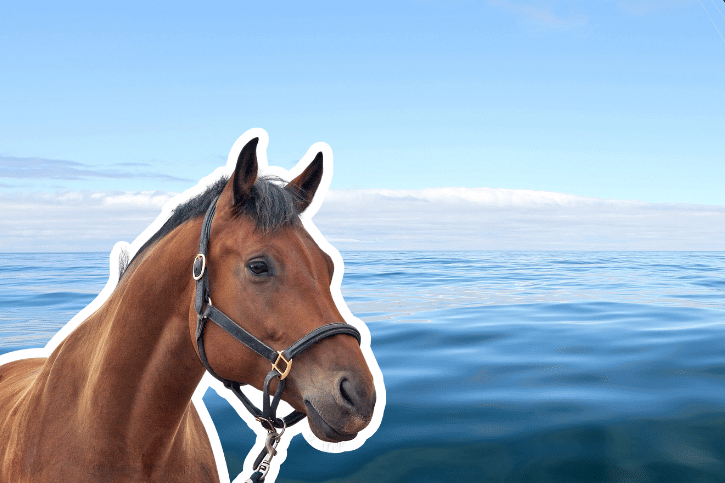Can Horses Drink Salt Water?
While at the beach with my family the other day, we noticed that there were horse rides happening just a few metres away from where we were.
At one point, a wave washed in so far that it almost soaked all four of the hooves of one of the horses, and my son insisted that the horse had leant down and taken a big gulp of the seawater.
I certainly saw it bend down, but I didn’t see it take a drink.
It got a debate going, naturally, so when we got home, I decided to look into it.
So, can horses drink salt water?
Horses should not and do not drink salt water. Salt water has the same effect on horses that it does on us: at best it dehydrates you hugely and at worst can make you very sick. Horses need fresh water, and no brackish or salt water.
The debate was put to rest, then.
Horses are no different from us when it comes to salt water—they just can’t process it.
In fact, the only animals who can are a select few sea mammals that are able to produce particularly salty urine.
In any case, let’s look at this in more detail.
Is salt water bad for horses?
The simple answer is yes, salt water is bad for horses.
Again, it’s very simple to understand why because it’s bad for all the same reasons it’s bad for us.
Salt is dehydrating, especially in the concentrations found in salt water.
Not only that, but there is so much of it in seawater that it’s likely to make your horse feel nauseous and sick.
Again, the horse won’t drink salt water of its own accord; it knows to stay away from it.
A horse that has never seen the sea before might take a sip, but this will be all it needs to know never to try again.
Salt water is very bad for horses, then, and it’s quite simple to see why.
As I said, the only animals that are able to drink seawater are aquatic mammals, such as otters, manatees and sealions.
These animals live in the water, and are able to produce urine salty enough to expel the seawater effectively.
Most horses in the wild are more likely to live quite far inland, since they need a lot of space to roam, so they simply wouldn’t ever come near salt water to even try it.
Will salt make a horse drink?
That said, salt itself is still quite important in a horse’s diet.
We all know the old adage that you can lead a horse to water, but you can’t make it drink.
This reflects how stubborn they can be sometimes, and is a possible reason why some might think they prefer seawater.
Sodium and chloride in a horse’s diet help tissue and organs retain water that they drink.
Water is essential to proper fermentation and digestion in the gut, since horses are notorious for having digestive troubles.
However, this does mean they can get this from saltwater.
The salt in salt water will not properly break down, and will just pass through their gut making them unwell.
You simply need to be sure that they’re getting the required amount of salt through their food.
Horses need, on average, between 1-2 tablespoons of salt per day.
Again, that is to say in their diet.
Manufacturers of horse feed usually guarantee a good level of salt in their feed, but make sure that your horse is getting enough for its size.
This salt is not only, in itself, essential to maintaining the horse’s health, but also will encourage it to drink more and thus get all the water it needs in its diet.
Salt is really key to your horse’s health.
Where do wild horses get salt?
You might be wondering how horses in the wild get access to salt in their diets, then, since it doesn’t seem to be so readily available.
Well, the important thing to remember first of all is that salt is present, to some extent, in their natural diet.
It can be found in trace amounts in the soil which is passed to them through the grass and foliage that they eat.
It’s not a lot, but horses spend most of their time grazing.
Other than that, there are in fact plenty of natural salt formations which horses can find on rocks.
Salt licks are pretty common in the kinds of areas where you find wild horses, so a horse’s success in a region will typically go hand in hand with available salt in the area.
Essentially, though, horses get most of their nutrients by just spending the vast majority of their waking hours grazing.
Feeding your horse formulated horse food is a key part of their diet, but you also really ought to be allowing them out to pasture as much as possible.
Salt water may be useful in treating a horse’s wounds, then, but it absolutely should be not be drunk by them.
Horses know this, too, and won’t ever drink salt water by choice.
There’s nothing complicated about a horse’s drinking habits: plenty of fresh water every day and they will be more than happy.
Keep them away from sea water, and you won’t have any problems getting your horse to drink.
